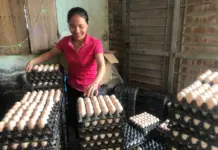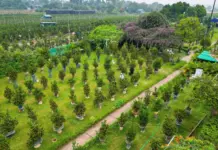Six-year-old Tran Tuan Long was overjoyed as he played with the new imaginative toys set up in Giam Garden inside the Temple of Literature. The giant wooden horse he climbed on had giant eyes made of old tires, while the horse’s mane was shaped into a slide, its legs were connected with climbing materials, and the tail was also a swing.
 |
| Thanh Giong Playground is located in Giam Garden at the Temple of Literature-Imperial Academy Relic Site. Photo: Van Mieu-Quoc Tu Giam Center for Cultural and Scientific Activities |
This is one of the children’s playgrounds created by Think Playgrounds, a Hanoi-based non-profit organization, in cooperation with Van Mieu-Quoc Tu Giam Center for Cultural and Scientific Activities.
Teaching children history through outdoor games
Inspired by the Vietnamese legend of Saint Giong, which tells of the giant footprint, bamboo bush, iron horse, or Mount Soc, the Thanh Giong Playgrounds recreates the legend and is expected to become a new entertainment spot for children at the famous monument in the heart of Hanoi.
More than just a playground for children, Quoc Dat, Co-Founder, Playground Designer, and Director of Think Playgrounds said it will also stimulate children’s curiosity and introduce Vietnamese culture to international friends.
“The Thanh Giong playground is our comprehensive learning space for children, where they can enjoy both physical activities and learn about creativity and Vietnamese history,” he said.
“Rather than emphasizing elements of war, the playground equipment themed around the legend tells of the strength of ordinary people who stood tall to protect their beloved country. Through simple, child-friendly symbols, we want the story to be a happy memory, but still full of connections to tradition,” he added.
Pham Phuong Lan, a parent from Dong Da District, said she was surprised to find a children’s playground at such a famous relics site in Hanoi. “It is such a wonderful idea considering the lack of playgrounds for children in the city. The playground would be a great place for children to both explore monuments and participate in physical exercise,” she said, “I would bring the kids here more often.”
Thanh Giong Playground was inaugurated in late September, on the occasion of the Vietnam Design Week 2023, which took place at the Temple of Literature-Imperial Academy. This is the first and largest annual design event in the country, organized by the Vietnam Design Group, the Vietnam National Institute of Culture and Arts Studies (VICAS), the Copyright Office of Vietnam (Ministry of Culture, Sports and Tourism), and the Hanoi Department of Culture and Sports, to seek out and honor outstanding Vietnamese designers and design works.
.jpg) |
| Thanh Giong Playground. Photo: Van Mieu-Quoc Tu Giam Center for Cultural and Scientific Activities |
Endless creativeness
Made entirely of recycled materials, the playground can help children actively develop their physical skills, psychological balance, group activities, risk management, and communication skills.
It is also a creative space for children to learn more about traditional culture. Based on a popular folk tale, the design team selected representative images and combined them with playful activities. As young visitors climb, slide and play hide-and-seek, they are immersed in cultural metaphors.
Thanh Giong Playground is based on the historical story of a young hero who used a village bamboo bush to fight Chinese invaders, a story known to every generation of Vietnamese children. His iron horse, giant footprint, bamboo bush and Mount Soc are recreated in the playground.
Located within the Hanoi Relic Site, it is not only a playground but also a special heritage site, a tourist attraction and a green public space. Hanoians and visitors to the capital, especially children, are welcome to relax, socialize, and learn about Vietnam’s history and traditions.
This is also the first large-scale playground that Think Playgrounds and the Van Mieu-Quoc Tu Giam Center for Cultural Activities collaborated to build in Giam Garden. The entire relic site is located in Dong Da District, where there is a severe lack of public spaces suitable for public activities. The project is a highlight that helps raise public awareness of the importance of uniquely designed play spaces combined with cultural heritage to make urban areas more creative and sustainable.
 |
| The playful structure is inspired by the iron horse in the legend of Thanh Giong. |
A connection to traditions
Hoping to gradually transform the Temple of Literature-Imperial Academy Relic Site into a center of cultural and educational activities as well as a creative space of the capital, Le Xuan Kieu, Director of Van Mieu-Quoc Tu Giam Center for Cultural and Scientific Activities, said: “We are very happy to build the Thanh Giong Playground in the Giam Garden of the Relic Site. This is a really interesting combination of tangible and intangible cultural heritage values, which is expected to bring special experiences to children and students in Dong Da District in particular and other areas when they visit the Relic Site”.
Designing public spaces has never been an easy task in Vietnam’s cities, as spaces are becoming smaller and smaller, while still having to meet different standards and needs of people from all walks of life. Urban playgrounds are a rare initiative in the field of public design that has been pursued for many years and has achieved considerable success by integrating the efforts of the government, community, creators, and beneficiaries.
According to Nguyen Anh Tuan, Artistic Director of Heritage Space and advisor to Vietnam Design Week, Thanh Giong Playground would definitely be a highlight of Vietnam Design Week 2023 and the first Design Fair VietNam, as well as a meaningful gift to visitors of the Temple of Literature and residents of the surrounding area in the long term.
Think Playgrounds is a social enterprise with many projects on recycled playgrounds, community gardens, ecological parks, community artworks, and more. The playground model is one of their efforts to localize playground designs so that they tell Vietnamese stories and are made by Vietnamese people using materials sourced and produced in Vietnam. This is also one of the features that Think Playgrounds tries to place in cultural spaces such as the Temple of Literature-Imperial Academy Ngoc Ha Communal House in Ba Dinh District or Co Loa Citadel in Dong Anh District in Hanoi.
Tourist sites in Hanoi reopened after one-day closure due to epidemic
The closure was carried out for sterilizing the sites, which would reopen when the disinfection work completed.








